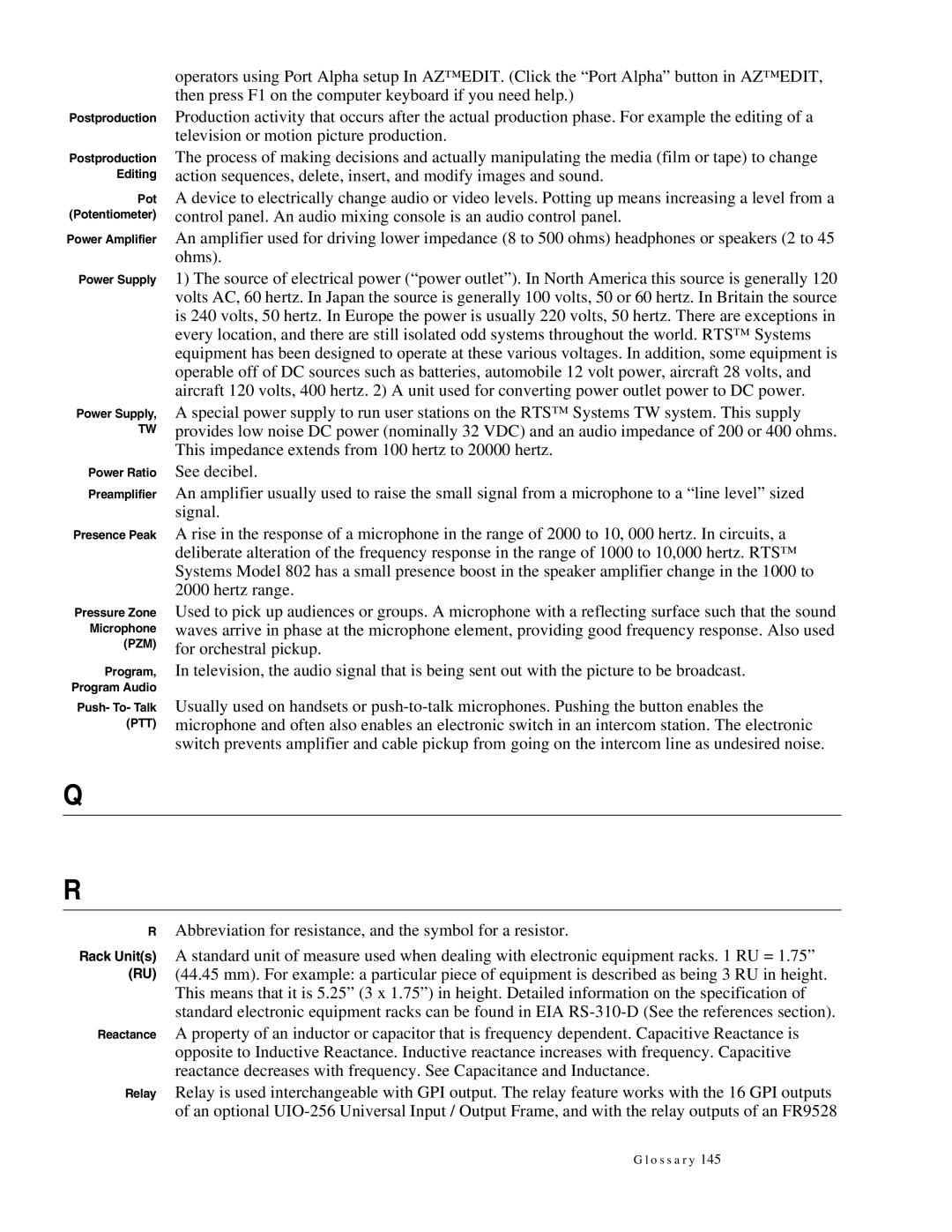
Postproduction
Postproduction Editing
Pot (Potentiometer)
Power Amplifier
Power Supply
Power Supply,
TW
Power Ratio
Preamplifier
Presence Peak
Pressure Zone
Microphone
(PZM)
Program, Program Audio
Push- To- Talk (PTT)
operators using Port Alpha setup In AZ™EDIT. (Click the “Port Alpha” button in AZ™EDIT, then press F1 on the computer keyboard if you need help.)
Production activity that occurs after the actual production phase. For example the editing of a television or motion picture production.
The process of making decisions and actually manipulating the media (film or tape) to change action sequences, delete, insert, and modify images and sound.
A device to electrically change audio or video levels. Potting up means increasing a level from a control panel. An audio mixing console is an audio control panel.
An amplifier used for driving lower impedance (8 to 500 ohms) headphones or speakers (2 to 45 ohms).
1)The source of electrical power (“power outlet”). In North America this source is generally 120 volts AC, 60 hertz. In Japan the source is generally 100 volts, 50 or 60 hertz. In Britain the source is 240 volts, 50 hertz. In Europe the power is usually 220 volts, 50 hertz. There are exceptions in every location, and there are still isolated odd systems throughout the world. RTS™ Systems equipment has been designed to operate at these various voltages. In addition, some equipment is operable off of DC sources such as batteries, automobile 12 volt power, aircraft 28 volts, and aircraft 120 volts, 400 hertz. 2) A unit used for converting power outlet power to DC power.
A special power supply to run user stations on the RTS™ Systems TW system. This supply provides low noise DC power (nominally 32 VDC) and an audio impedance of 200 or 400 ohms. This impedance extends from 100 hertz to 20000 hertz.
See decibel.
An amplifier usually used to raise the small signal from a microphone to a “line level” sized signal.
A rise in the response of a microphone in the range of 2000 to 10, 000 hertz. In circuits, a deliberate alteration of the frequency response in the range of 1000 to 10,000 hertz. RTS™ Systems Model 802 has a small presence boost in the speaker amplifier change in the 1000 to 2000 hertz range.
Used to pick up audiences or groups. A microphone with a reflecting surface such that the sound waves arrive in phase at the microphone element, providing good frequency response. Also used for orchestral pickup.
In television, the audio signal that is being sent out with the picture to be broadcast.
Usually used on handsets or
Q
R
RAbbreviation for resistance, and the symbol for a resistor.
Rack Unit(s) (RU)
A standard unit of measure used when dealing with electronic equipment racks. 1 RU = 1.75” (44.45 mm). For example: a particular piece of equipment is described as being 3 RU in height. This means that it is 5.25” (3 x 1.75”) in height. Detailed information on the specification of standard electronic equipment racks can be found in EIA
Reactance
Relay
A property of an inductor or capacitor that is frequency dependent. Capacitive Reactance is opposite to Inductive Reactance. Inductive reactance increases with frequency. Capacitive reactance decreases with frequency. See Capacitance and Inductance.
Relay is used interchangeable with GPI output. The relay feature works with the 16 GPI outputs of an optional
